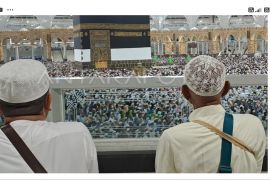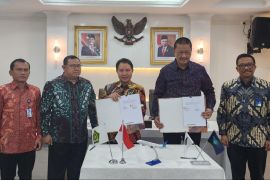Deputy Minister of Religious Affairs Nasaruddin Umar said the bracelet will enable concerned authorities to locate Indonesians, who are lost in Saudi Arabia while conducting hajj pilgrimage rituals, and bring them back to their hotels.Jakarta (ANTARA News) - Indonesias government is discussing plans to equip hajj pilgrims with electronic bracelets to reduce the number of Indonesians lost in Saudi Arabia, Deputy Minister of Religious Affairs Nasaruddin Umar said here on Tuesday.
The deputy minister argued that the bracelet will enable concerned authorities to locate Indonesians, who are lost in Saudi Arabia while conducting hajj pilgrimage rituals, and bring them back to their hotels. However, he emphasized that the plan to use electronic bracelets will not be implemented in 2014, as their procurement was still being discussed by the authorities.
"We will continuously improve the service provided to Indonesian pilgrims," Nasaruddin said.
Interim Religious Affairs Minister Agung Laksono, who is also the chief peoples welfare minister, said the implementation of hajj pilgrimage in 2014 will be better.
"The hajj pilgrimage management is expected to be better this year, as the hajj pilgrimage cost will be cut by about 8.2 percent. Thus, the hajj pilgrimage will cost only about Rp33 million per pilgrim. It can be lower than that depending on the distance," Agung Laksono said after delivering a speech at a congress organized by the Indonesian Muslim Students Movement (PMII) here over the weekend.
He said preparations made so far for the implementation of the hajj pilgrimage in 2014 were almost 100 percent complete. After all, President Susilo Bambang Yudhoyono had signed a presidential decree on the hajj pilgrimage cost (BPIH).
The Ministry of Religious Affairs had also prepared a religious affairs ministers regulation, which was expected to be approved on June 2.
Regulations on the deadline of the BPIH payment and the amount of the BPIH a pilgrim has to pay were also prepared.
"The BPHI this year is reduced by 8.2 percent and that is positive because efficiency can be implemented, while the government will not reduce the quality of its services," he said.
The acting religious affairs minister added that the government had prepared all services for the implementation of the hajj programs in Saudi Arabia, including lodging, transportation and catering.(*)
Editor: Heru Purwanto
Copyright © ANTARA 2014











